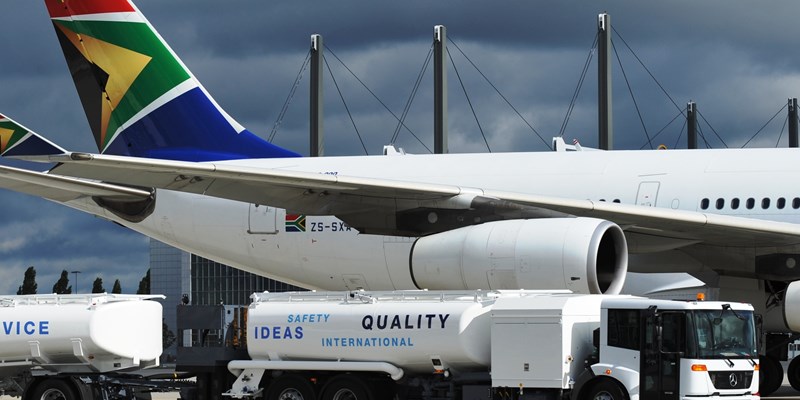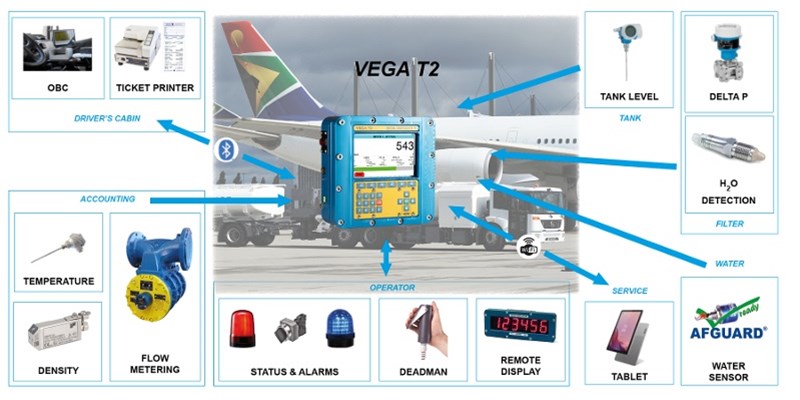Density in Aircraft Fuel Management Systems

An optimal aircraft fuel management system is essential for aviation efficiency and safety and one important parameter to monitor is density.
In this article, we'll explore the pivotal role density plays in aircraft fuel management systems by explaining the following key points:
- Why is density crucial for aircraft fuel management systems
- How flow computer VEGA T2 manages density
- Advantages of choosing VEGA T2 to measure density for aircraft refuelling operations
Why is density crucial for Aircraft Fuel Management Systems
Measurement of jet fuel and AVGAS during aircraft refuelling operations is performed by volume as the invoicing is based on volume.
The PD flow meter measures the volume of the fuel loaded, and, by means of an electronic register, such as VEGA T2 with an input from a PT100 temperature sensor, may work out the corrected volume at the reference temperature (typically 15°C or 60°F). This is a very useful information for the reconciliation process at the end of the day.
Having the corrected volume at the reference temperature allows VEGA T2 also to work out the mass of the delivered quantity as well, based on the density value (corrected at the reference temperature) which has been entered into the VEGA T2 flow computer.
For a much higher degree of accuracy of the measurement of the weight of the delivered mass, a density meter maybe added to the system, which provides a real time measurement of the density of the aviation fuel at that precise moment.
How flow computer VEGA T2 manages density
VEGA T2 offers the possibility of interfacing to the density meter over Modbus (depending on the densitometer model) so that it can acquire in real time the measurement of the mass.

This offers several important benefits:
- VEGA T2, based on the input from the PT100 temperature sensor, can work out the density at the reference temperature by selecting the specific temperature volume correction factor on the ASTM D1250-04 MPMS chapter. 11.1 table it has in its memory, specific for that density & temperature values, achieving a might higher accuracy in this operation.
- VEGA T2 can work out the mass of the fuel delivered, by multiplying the corrected volume by the corrected density.
This is a solution for all those situations where, besides the volume measurement necessary for the invoicing process, an accurate measurement of mass is requested, too.
Advantages of choosing VEGA T2 to measure density for aircraft refuelling operations
When in combination with ISOIL PD meters, the installation of density sensor could be easily performed by installing it directly onto the meter manifold, using one of the connections available as standard on the BM meter series, without the need of any piping modification or welding.
The density meter can be then directly connected to the power supply of the vehicle and to VEGA T2 via Modbus.
This approach offers the following advantages:
SENSOR
- Extremely compact solution;
- By pass installation onto the ISOIL meter manifold, by means of one of the existing connections;
- No need of pipe work or modification;
- Retrofit kit for ISOIL PD meters;
- No need of extra I/O boards for VEGA T2. Modbus RTU available as standard.
OPERATIONS
- Observed density acquisition over Modbus RTU and display;
- Mass unit of measurement: grams, kilograms, pounds, tons;
- Mass calculation:
- Gross volume multiplied by observed density
- Gross Standard Volume calculation
- Calculation according to ASTM D1250-04 MPMS Ch. 11.1;
- Standard density calculation starting form observed density and observed temperature;
- Simultaneous display of volume & mass;
- Printout of volume and mass;
- Printout of average density of the delivery.
Contact us for more information about our services and products
Form sent successfully
Error
